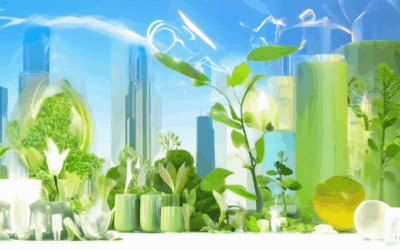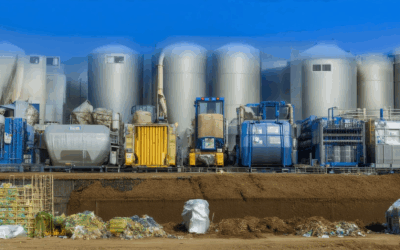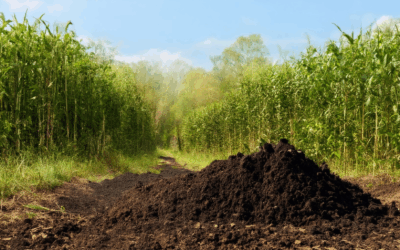Biochar, a versatile and sustainable solution, has emerged as a groundbreaking approach to enhancing agricultural productivity. This organic material, derived from carbon-rich biomass, offers numerous benefits for soil health, nutrient retention, and overall crop performance. While widely recognized for its potential to improve yields and reduce environmental impact, biochar adoption remains a subject of curiosity and debate among farmers and agricultural experts. In this article, we delve into the intricacies of biochar usage, exploring both its promising advantages and the challenges that hinder widespread adoption. From understanding its role in boosting crop yields to addressing concerns about its effectiveness and practicality, this comprehensive guide provides valuable insights into how biochar can revolutionize modern farming practices. Whether you’re a seasoned farmer or new to sustainable agriculture, this exploration of biochar’s applications and best practices will equip you with the knowledge needed to harness its full potential.
Key Takeaways
– Improves Soil Structure and Porosity: Enhances root penetration and water infiltration for healthier plants.
– Enhances Microbial Activity: Supports nutrient cycling and soil fertility, promoting robust plant growth.
– Increases Nutrient Retention: Reduces leaching, ensuring nutrients stay available for crops.
– Boosts Crop Yields: Improves productivity and resilience in challenging growing conditions.
– Challenges Include High Energy Use: Requires significant energy input, potentially increasing carbon emissions.
– Cost Prohibitive for Some: Initial investments and operational costs may limit accessibility for smaller-scale farmers.
– Inconsistent Quality Can Affect Results: Poor production processes may lead to ineffective biochar applications.
– Market Resistance and Regulatory Hurdles: Established fertilizers may slow adoption due to competition and regulations.
– Public Misinformation Hinders Adoption: Lack of awareness and misconceptions may deter farmers from using biochar.
– Scalability Issues Limit Wider Adoption: Production expansion faces barriers like infrastructure and supply chain complexities.
– Not Suitable for High pH Soils: Avoids alkalization in acidic soil preferred by certain plants.
– Avoid for Ericaceous Plants: Protects delicate plants needing acidic conditions.
– Low-Quality Processing Can Be Disadvantageous: Insufficient processing reduces effectiveness.
– Excessive Use Can Harm Soil pH: Risks unbalanced alkalinity affecting plant health.
– Nitrogen Competition Reduces Plant Health: Overuse may strain nitrogen availability, harming growth.
– Apply Moderately, Test First, Monitor: Optimal use ensures benefits without harm, guided by soil and plant needs.

Can Biochar Improve Crop Yields?
Biochar, a carbon-rich material produced through pyrolysis of organic waste, has gained attention for its potential to enhance agricultural productivity. Research indicates that biochar can indeed improve crop yields by addressing various challenges in farming systems.
One of the primary benefits of biochar is its ability to amend soil structure. By adding carbon to the soil, biochar increases soil porosity, reduces compaction, and improves water infiltration. This leads to better root penetration and plant growth conditions.
- Nutrient Availability: Biochar acts as a slow-release fertilizer, providing essential nutrients like phosphorus, potassium, and magnesium to plants. These nutrients are often leached out of soils over time, but biochar helps retain them, reducing the need for frequent fertilization.
- Microbial Activity: Biochar serves as a habitat for beneficial microorganisms, which enhance soil fertility and plant resistance to diseases. Its porous structure provides an environment where these organisms thrive, leading to healthier soil ecosystems.
- Climate Resilience: Biochar improves soil health, making crops more resilient to droughts, floods, and extreme temperatures. Its ability to hold moisture and regulate soil temperature contributes to stress tolerance in plants.
Studies have shown that applying biochar can increase crop yields by up to 20% in certain conditions. Farmers report improved crop health, higher fruit and vegetable production, and better overall farm profitability. Incorporating biochar into farming systems can also reduce reliance on synthetic fertilizers and pesticides, promoting sustainable agriculture.
To maximize the benefits of biochar, it’s important to understand proper application techniques. Mixing biochar with compost or other amendments can enhance its effectiveness. Pyrolysium offers resources and guidance on how to implement biochar in farming practices, helping you achieve optimal results.
Learn more about the science behind biochar and its applications in modern agriculture by visiting our website: Pyrolysium . Discover how biochar can transform your farming operations and contribute to a more sustainable future.
Why Don’t Farmers Use Biochar?
Farmers may choose not to use biochar due to several factors:
- Cost and Production Challenges :
Biochar production requires specific equipment and processes, which can be costly and technically demanding. Small-scale farmers may find the initial investment prohibitive, and the lack of accessible production facilities further complicates matters. - Adoption Barriers :
Farmers often prefer tried-and-true methods. Biochar, while promising, may face skepticism due to a lack of proven effectiveness in diverse farming conditions. Without visible results in their specific contexts, many remain cautious. - Regulatory Hurdles :
Biochar may not be recognized as a legitimate fertilizer in all regions, leading to legal challenges for farmers attempting to use it. Without proper approval, farmers might avoid incorporating it into their practices. - Education and Support Limitations :
Access to workshops or resources explaining biochar usage can be scarce. Without guidance, farmers may struggle to appreciate its benefits or integrate it effectively into their existing systems. - Competition from Traditional Fertilizers :
Established chemical fertilizers remain dominant due to their widespread availability and lower costs. Biochar’s position as an alternative may be hindered by marketing gaps and a lack of awareness. - Lack of Large-Scale Demonstration Projects :
Without substantial evidence from large-scale trials tailored to various climates and soils, farmers might remain unconvinced of biochar’s reliability.
Addressing these challenges through cost reduction, educational campaigns, regulatory support, and competitive pricing could encourage greater biochar adoption.

Controversy Surrounding Biochar
Biochar, a carbon-rich material produced through pyrolysis of organic waste, has sparked debate due to several factors:
- Production Process Concerns: The high-energy pyrolysis required for biochar production raises questions about its environmental footprint, including greenhouse gas emissions and energy consumption.
- Effectiveness Disputes: While studies highlight biochar’s benefits for soil health, others challenge these claims, leading to scientific disagreements and varying farmer experiences.
- Economic Accessibility: Production costs can be prohibitive, limiting widespread adoption, particularly in regions with limited resources.
- Regulatory Inconsistencies: Variability in product standards may confuse users and lead to mistrust among those relying on biochar as a soil amendment.
- Sourcing Issues: The use of certain biomasses raises concerns about indirect environmental impacts, such as deforestation or competition with food security.
- Ethical Considerations: Debates arise over whether biochar production diverts resources from more pressing needs, affecting land use and food availability.
These multifaceted issues contribute to the ongoing discussion about biochar’s role in sustainable agriculture and environmental management.

The Negatives of Biochar
Biochar, while touted as a sustainable and beneficial product, does have certain drawbacks:
- High Energy Requirements:** The production process of biochar, which involves pyrolysis, can be energy-intensive. This may lead to increased carbon emissions if non-renewable energy sources are used.
- Cost Prohibitive:** The initial investment and ongoing operational costs associated with biochar production can be substantial, potentially limiting accessibility for smaller-scale operations and less developed regions.
- Inconsistent Quality:** Variability in the production process can result in biochar products with differing qualities, leading to inconsistent effectiveness when applied in agricultural settings.
- Market Competition:** Established players in the fertilizer industry may resist biochar adoption, leading to marketing challenges and regulatory obstacles that could hinder its widespread acceptance.
- Public Perception Issues:** Lack of understanding or misinformation about biochar’s benefits and application methods could deter its adoption among farmers and gardeners.
- Scalability Challenges:** Expanding biochar production to meet growing demand may face barriers such as limited infrastructure and complex supply chains.
When Not to Use Biochar
Biochar, derived from organic matter through pyrolysis, offers numerous agricultural benefits, but its use isn’t universally advisable. Here are scenarios where biochar may not be suitable:
- High Soil pH Risk:** Avoid using biochar if your soil already has a pH level above 7. Applying biochar can further elevate alkalinity, potentially harming plants that thrive in acidic conditions.
- Ericaceous Plants:** Refrain from using biochar in gardens cultivating ericaceous plants like azaleas or rhododendrons, as their preference for acidic soil conflicts with biochar’s alkalizing effect.
- Inadequate Processing:** Low-quality biochar, resulting from improper pyrolysis, may lack effectiveness. Ensure the biochar is sourced from well-processed materials for optimal benefits.
- Excessive Application:** Overusing biochar can overwhelm soil systems, leading to unintended pH increases. Balance is key to harnessing its advantages effectively.
- Necessity:** In environments or farming contexts where biochar’s specific benefits aren’t required, its use might be unnecessary, constituting a resource waste.

Can You Use Too Much Biochar?
Yes, using too much biochar can have negative effects on your garden. Here’s what you need to know:
- Soil pH Balance: Excessive biochar application can increase soil alkalinity. Different plants have varying tolerances to pH levels, and overuse may lead to plant stress or nutrient deficiencies.
- Nitrogen Competition: Biochar enhances microbial activity, which can outcompete plants for nitrogen. This may reduce plant growth and health.
To avoid these issues, follow these guidelines:
- Apply Moderately: Use biochar in recommended quantities based on your soil type and plant needs.
- Test First: Conduct a small-scale test before full application to assess your soil’s reaction.
- Monitor Effectively: Observe plant health and adjust application rates as needed.
By balancing biochar use, you can maximize its benefits without harming your garden.




0 Comments